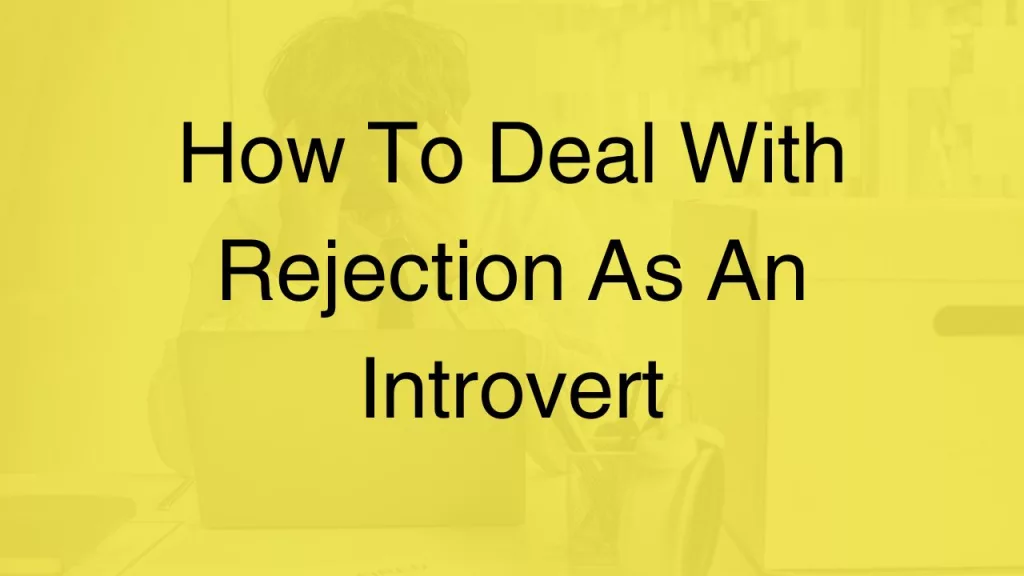Dealing with rejection is an inevitable facet of life, and it can be particularly challenging for introverts who often lament in and overthink situations. Experiencing rejection, whether it’s from a job interview, a chance for a promotion or a work proposal, can leave you feeling demoralised and fed up.
This article provides six practical steps to help introverts deal with rejection and turn the negative situation into a catalyst for personal growth.
Let’s begin!
6 Ways To Deal With Rejection
Here are 6 practical steps to deal with rejection:
1. Take A Breath:
When faced with rejection, it’s natural to experience a range of emotional and physical reactions. However, before reacting impulsively, take a moment to breathe and regain composure.
Utilising breathing techniques can work wonders here. The 4-7-8 technique, for example – inhaling for 4 seconds, holding for 7, exhaling for 8, and repeating – has been proven to lower stress levels and decrease the chance of oncoming anxiety or panic attacks.
Once you feel calm and composed, you will then be in a better mindset to analyse the situation properly and plan your next steps accordingly.
2. Find A Support System:
Introverts often find strength in solitude. However, having a support system is crucial in times like this. When hit with rejection, reach out to your family and friends to share your experience and how you are feeling. They will likely offer you guidance, support, encouragement and a different perspective on the situation.
Other people will also be able to share their own rejection experiences and explain how they learned from them. This can provide valuable insight and ideas on your next steps.
3. Remember That Rejection Is Common:
Everybody faces rejection at some point in their life, whether big or small. Understanding that rejection is a universal experience can help you to put your situation into perspective. It’s not the end of the world, nor the end of your career. It is simply a redirection.
To help you along, here are some famous faces who faced rejection early in their careers:
- Walt Disney – was fired from his job at Kansas City Star Newspaper because he ‘lacked imagination and had no good ideas’.
- J.K. Rowling – was rejected by 12 publishers for her novel Harry Potter & The Philosopher’s Stone.
- Oprah Winfrey – was fired from her job as a Television Reporter and told that she was ‘unfit for TV’.
- Sidney Poitier – was rejected by a casting director and told to ‘become a dishwasher’ instead.
- Fred Astaire: was noted by an early testing director as someone who: ‘Can’t act. Can’t sing. Slightly bald. Can dance a little.’
4. Reflect On What You Could Have Done Differently:
While rejection may not always be solely the result of personal actions, it is constructive to reflect on your actions and the process leading to the rejection. For example, you could ask:
- Did I prepare thoroughly for the job interview?
- Did I work hard enough to earn that promotion?
- Did I confidently express my ideas in the work proposal?
Write down your thoughts as you go through your questions. This will help you to compartmentalise your thoughts and start to see areas for improvement.
However, it is important to remember that people make decisions for all sorts of reasons, that could have nothing to do with you. Their decision to reject you could be due to budget cuts or choosing to hire someone in-house rather than externally. If you want closure, reach out to the relevant person and ask for their feedback and reason for their decision.
5. Examine New Opportunities:
When facing rejection, choose to see it as a redirection. With one door closed you can now spend your time and effort on another pursuit. This is the perfect time to rethink your situation and reexamine your choices.
It’s important here not to reduce your goals. It can be tempting, when rejected, to lower your standards. While this can be helpful in the short term in some instances, do not change your dream because of one rejection. Reexamine your opportunities, but do not lower your expectations for yourself.
6. Get Going:
You’ve paused, reflected, and analysed the situation. Now it’s time to take action. This doesn’t have to happen straight away; the above steps can take time. However, you should never wallow in your rejection for longer than you need. This can lead to disenchantment and a self-defeatist attitude.
So get moving. Get on with your life and start striving for that next dream. This rejection is simply one part of your journey and will soon become nothing more than a story.
Why Rejection Is A Good Thing:
As rubbish as rejection can feel in the moment, it can be great in the long term. Rejection can:
- Build character.
- Redirect you to better things.
- Challenge your goals.
- Make a good story.
- Make success feel better.
- And much more!
Rejection also makes for a compelling narrative. It transforms mundane experiences or careers into stories of resilience, tenacity, and eventual triumph. Your journey, complete with its highs and lows, will become a testament to perseverance.
Final Thoughts:
Remember, rejection is not a reflection of your worth. It is merely a detour on the path to success. Every rejection is a redirection; an opportunity to learn, adapt, and build character.
It can be hard to deal with rejection. But it is important to not give up. Instead, view it as a crossroads and navigate the situation with resilience, introspection, and a commitment to improvement.
Let me know your thoughts on the above steps in the comments!



